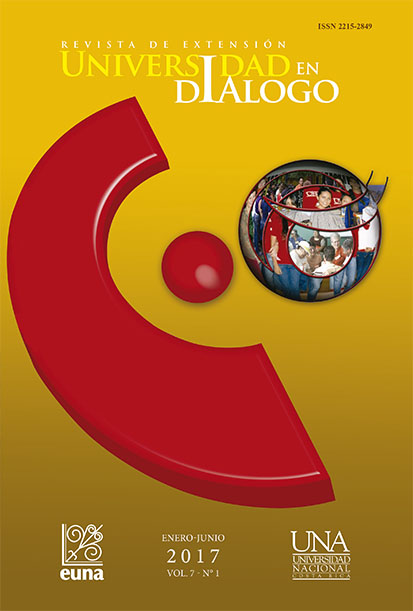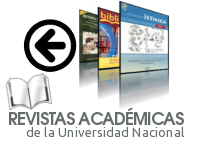Women and Ecofeminism: An Approach to Sustainable Development
DOI:
https://doi.org/10.15359/udre.7-1.3Keywords:
cofeminism, sustainable development, capitalist mode of production, women, gender Relationships.Abstract
Nowadays, both the environmental theme and sustainable development theories occupy a central place in the debates of several areas of knowledge, requiring a more in-depth reflection on human behaviors among themselves and the natural environment. In light of this, it must be considered that societies based on the capitalist mode of production present a great difficulty in ensuring human, social and environmental development that is sustainable and, at the same time, has advanced towards dehumanization and destruction of the planet.
Based on the method of socio-historical-analytical procedure and a feminist approach, this paper seeks to analyze the relationship between women and the environment, inquiring if there is any relation between exploitation and domination of nature and domination and subordination of women in the gender relations. Studies based on ecofeminist theories have found that there is a consistent link between the exploitation of the natural environment and women. This link is supported by processes based on the capitalist mode of production and on patriarchal human relations, since there is an objectification of both women and nature. This shows that the proximity between women and ecosystem is much closer than by a natural factor, but by the conditions of power imposed. Thus, in front of the environmental crisis, the ideas and experiences of care and solidarity experienced by women are valid in order to propose alternatives for changes aimed at a sustainable development.
References
Badinter, E. (1986.) Um é o outro. Relações entre homens e mulheres. Rio de Janeiro: Nova Fronteira.
Beauvoir, S. (1968). Das andere Geschlecht: Sitte und Sexus der Frau. Hamburg: Rowohlt.
Casares, A. (2012). Antropología de Género: culturas, mitos y esterotipos sexuales. Tercera Edición. Universitat de València. Madrid: Ediciones Cátedra Grupo Anaya.
Eagleton, T. (2005). A idéia de Cultura. Tradução Sandra Castello Branco. São Paulo: Editora UNESP.
Ehrenreich, B., english. (1984). Deirdre. Hexen, Hebammen und Krankenschwestern. 11. Auflage. München: Frauenoffensive.
Eisler, R. (2007). O cálice e a espada: nosso passado, nosso futuro. Tradução de Ana Luiza Dantas Borges, Rocco. Rio de Janeiro.
Eisler, R. (1996). O prazer sagrado: sexo, mito e política do corpo. Tradução de Tônia Van Acker. São Paulo: Palas Athena.
Fraser, N. (2007a). Reconhecimento sem ética? Revista Lua Nova. São Paulo, 70, 101-138.
Fraser, N. (2007b, maio-agosto). Mapeando a imaginação feminista. Estudos Feministas. Florianópolis, 15(2), 291-308.
Fraser, N. (2011, Jul-Dez). Mercantilização, proteção social e emancipação: as ambivalências do feminismo na crise do capitalismo. Revista Direito GV. São Paulo, 7(2), 617-634.
Fraser, N. (2010). Redistribuição, Reconhecimento e Participação: Por uma Concepção Integrada da Justiça. In: SARMENTO, Daniel; IKAWA, Daniela; PIOVESAN, Flávia (Orgs.). Igualdade, Diferença e Direitos Humanos. 2ª tiragem. Rio de Janeiro: Editora Lumen Juris, p. 167-190.
Gebara, I. (1997). Teologia Ecofeminista. São Paulo: Editora Olho d’Água.
Hall, S. (2005). A identidade Cultural na pós-modernidade. Tradução: Thomaz Tadeu da Silva; Guacira Lopes Louro. Rio de Janeiro: DP&A editora.
Holland-Cunz, B. (1996). Ecofeminismos. Traducción: Arturo Parada.Madrid: Ediciones Cátedra.
Lagarde y de los Ríos, M. (2011). Los cautiverios de las mujeres: Madresposas, monjas, putas, presas y locas. Madrid: Romanyà Vakks.
Menschik, J. (1977). Feminismus, geschichte, theorie und praxis. Köln: Verlag Pahl Rugenstein.
Mies, M., Shiva, V. (1995). Ökofeminismus. Beiträge zur Praxis und Theorie. Zürich: Rotpunkt-Verlage.
Perrot, M. (2007). Minha história das mulheres. Tradução de Angela M. S. Côrrea. São Paulo: Contexto.
Puleo, A. H. (2002). Feminismo y Ecología. El Ecologista. Nº 31. Espanha.
Puleo, A H. (2013). Ecofeminismo: para otro mundo posible. Segunda Edición. Valência (Espanha): Ediciónes Cátedra Universitat de València – Instituto de la Mujer, 2013.
Ruether, R R. (1993). Sexismo e Religião: rumo a uma teologia feminina. Tradução de Walter Altmann; Luís Marcos Sander. São Leopoldo, RS: Sinodal.
Yll, E Sanahuja. (2007). La cotidianeidad em la prehistoria: la vida y su sostenimiento. Mujeres, Voces y Propuestas. Barcelona: Icaria Antrazyt.
Downloads
Published
How to Cite
Issue
Section
License

La Revista y cada uno de los artículos que se publican están licenciados por Creative Commons Atribución No comercial Sin derivadas 4.0 Internacional.



